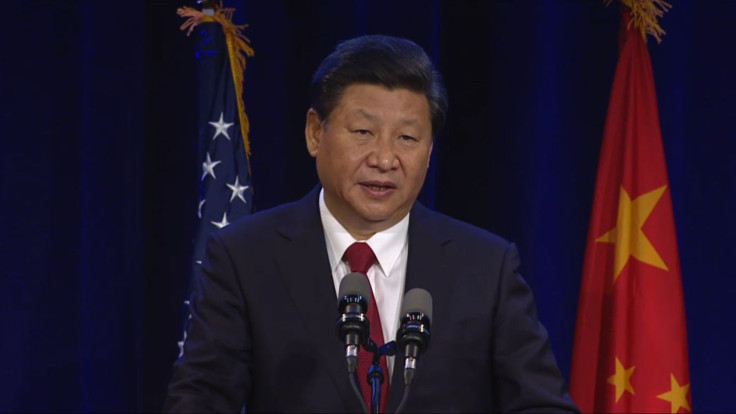Xi Jinping: China Is Ready To Work Together With US To Build A Peaceful Cyberspace

China's President Xi Jinping kicked off his first state visit to the United States by denying claims that the Asian power engages in commercial cybercrime and by calling on the two countries to work together to fight hackers. Xi delivered his remarks at a Tuesday dinner in Seattle, speaking to an audience of 800 U.S. and Chinese business and government leaders.
Xi delivered his remarks amid high tensions between the U.S. and China following cyberattacks on two U.S. federal agencies this year that many have blamed on China. Those attacks, along with cyberattacks on American tech firms, have led President Barack Obama to hint that sanctions may be imposed against China if these actions continue.
"China is a strong defender of cybersecurity. It is also a victim of hacking," Xi said in a speech that stressed cooperation between the U.S. and China on a wide range of issues currently faced by the two countries. "The Chinese government will not, in whatever form, engage in commercial thefts or encourage or support such attempts by anyone. Both commercial cybertheft and hacking against government networks are crimes that must be punished in accordance with the law and relevant international treaties.
"The international community should, on a basis of mutual respect and mutual trust, work together to build a peaceful, secure, open and cooperative cyberspace," Xi continued, according to his translator. "China is ready to set up a high-level joint-dialogue mechanism with the United States on fighting cybercrimes."
Xi's speech marked the opening leg of his first state visit to the United States and precedes a Thursday trip to Washington, where he will be greeted with a 21-gun salute and an official state dinner by Obama. Besides cybersecurity, the two countries are hoping to work out their differences on a number of issues, ranging from climate control to China's building of islands with military bases throughout the South China Sea.
Xi and the Chinese tech sector are hoping for continued cooperation and help from the U.S. tech industry as China's economy shifts from one driven by exports to a model that relies on consumer purchases. Xi and the rest of his delegation will continue this dialogue with American tech industry leaders on Wednesday throughout a variety of forums, meetings and a dinner at the home of Microsoft co-founder Bill Gates. Xi also is scheduled to meet with Apple CEO Tim Cook, Amazon CEO Jeff Bezos and Microsoft CEO Satya Nadella while in Seattle.
Prior to Xi's speech, U.S. Secretary of Commerce Penny Pritzker took the podium at the dinner and expressed that the U.S. is serious about China standing down on cyberattacks and becoming more cooperative when dealing with American businesses.
"We and our companies continue to have serious concerns about an overall lack of legal and regulatory transparency, inconsistent protection of intellectual property, discriminatory cyber and technology policies and, more generally, the lack of a level playing field across a range of sectors," Pritzker said. "We expect to have candid and constructive discussions on these matters in the coming days, but it is absolutely in our mutual economic self-interest to resolve these issues."
Xi concluded his speech by calling for cooperation between the U.S. and China, and asking that neither country fall victim to misreadings of, or paranoia over, each other's strategies. “We want to see more understanding and trust, and less estrangement and suspicion,” Xi said. “Cooperation is the only right choice to bringing about benefits, but cooperation requires mutual accommodation of each other's interests and concerns.
"If the U.S. and China cooperate well, they can become a bedrock of global stability and a booster of world peace,” Xi went on to say. “Should they enter into conflict or confrontation, it will lead to disaster for both countries and the world at large.”
John Dickson, a former U.S. Air Force intelligence officer and a principal at security specialist Denim Group, said Xi’s comments were a negative way for him to start his state visit, as most evidence points to China partaking in commercial cybertheft. "If the starting point is flat-out denial, I’m not sure what the common ground is,” Dickson said. "These statements further separated China from the league of lawful nations, not brought them closer.”
Other experts said Xi had no choice but to deny state-sponsored cybertheft. "Xi had no alternative but to deliver a diplomatic address if he wants to move the ball forward on both the global-trade front and developing a set of norms to govern cyberspace,” Trevor Nagel, a partner at the law firm White & Case, said. “What else could he say?”
The speech's silver lining was Xi's setting of a clear goal of working toward a peaceful cyberspace. "Xi has to realize in doing so, he has staked a position against which China will be measured not only by the U.S. but also by the international community,” Nagel said.
© Copyright IBTimes 2025. All rights reserved.




















